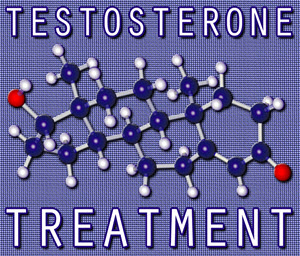Video Link: https://vimeo.com/294054397
Video Download: Click Here To Download Video
Video Stream: Click Here To Stream Video

A recent study conducted by a Duke Anthropologist provides stunning insights into the way that human civilization formed countless ages ago.
In this study, nearly 1,500 modern and ancient skulls were measured and examined, and the conclusion is that modern males have much less Testosterone-related activity than their ancient counterparts, which likely played a role in mankind's ability to form the large social groups which were needed to preclude modern civilization.
Testosterone Potent Psychological and Social Force in Today's Society
Even today, Testosterone is a powerful force that impacts male personality. Men with more Testosterone are more assertive and more willing to take control of situations, whereas men with less Testosterone are more likely to be led and also to form more stable relationships with others.
Male Skull Structure has Evolved Over Time
The human skull structure of males changed dramatically since antiquity. Early men had strong, pronounced brows and more squarish heads, and as Testosterone Levels dropped, men began to form rounder, smoother skull, and facial features. Based on medical research, this change can be almost universally attributed to a decline in the average Testosterone Activity of man over time.
Robert Cieri was the lead researcher of this study, and his work was monitored by Steven Churchill, an Anthropologist that teaches and conducts research for Duke University.
Were Physiological Changes the Result of Less Testosterone, or a Body Less Responsive to Testosterone?
There are multiple hypotheses regarding how this decline in Testosterone activity took place during antiquity, however. It could be that men began to produce less Testosterone than their ancestors, but it could also be possible that they just became less sensitive to the influence of circulating Testosterone. Testosterone depends on receptor sites to produce effects, and if ancient men started to have fewer, the effects of Testosterone would be less pronounced in spite of similar Testosterone circulation.
Animal Research Important in Our Understanding of Testosterone and Aggression
Robert Cieri was not the only investigator in this study, he also had the assistance of Jingzhi Tan and Brian Hare, two researchers that specialize in animal psychology and cognition. Their expertise allowed Cieri to come to these competing hypotheses.
In particular, the researchers took into account a study of Siberian foxes. In this study, the foxes were bred to be more accepting of human interaction, and in the process, they experienced physiological changes that were not unlike those experienced by human beings as their Testosterone Levels declined. They became more docile and were less anxious around humans.
The Social Interactions of Bonobos and Chimpanzees Are Intricately Connected to Testosterone
Dr. Hare also drew inferences from the differences among ape species, bonobos, and chimpanzees in particular. Chimpanzees produce a lot of Testosterone and they are very aggressive and seek dominance, whereas bonobos are special among ape species because they are non-monogamous and there is far less aggression amongst males, a sign of their lower Testosterone Levels.
In ape species, there is interspecies evidence regarding the impact of Testosterone, and in the Siberian fox study, there is evidence that aggression can be bred out of a species, and as that decline occurs, Testosterone activity declines.
Bonobos Respond to Stress with Cortisol, Chimpanzees with Testosterone
Dr. Hare explains that bonobos and chimps live in very different social environments, mature differently, and react to stressors in their own unique ways. When male chimpanzees reach adolescence, their Testosterone Levels skyrocket, whereas bonobo chimps don't experience the same burst of sex hormones.
The two species also react differently to stressors in a similar manner. When chimpanzees get stressed out, their brains respond by releasing Testosterone, which increases their aggression toward their peers, whereas bonobos release a burst of cortisol, a stress hormone that encourages them to ameliorate the situation and back down rather than get into fights.
Because of the dramatically different ways that their bodies use Testosterone, their physical features differ dramatically as a result. Male chimpanzees have big, set, brows, whereas male bonobos have smooth, rounded foreheads almost universally.
Skulls of Humans Throughout History Provide Evidence of the Changing Role of Testosterone
Whereas the other two researchers were brought in for their specialty with animals, Cieri's purpose was to gather data from various skulls from different eras of human society.
He compared the interior volume of the skull as well as the structure of the face and brow of human skulls from three different periods. He compared existing data on over 1,300 modern skulls from thirty different ethnic groups around the world to forty-one skulls from 10-38,000 years ago, then compared those to thirteen skulls that were from humans that lived over 80,000 years ago.
What he found after measuring their features was that, over time, the upper face shortened, and the brow became less pronounced. Both of these are strong signs that Testosterone became less active as humans continued to develop and evolve.
Human Beings Rapidly Developed Signs of Culture Around 50,000 Years Ago
Human beings as they exist today have been around for over 200,000 years. Although humans remained physically very similar over this time, at some point about 50,000 B.C.E, humans began to develop a number of techniques associated with enhanced learning and social interaction.
They learned to control fire, they started to develop equipment capable of hunting birds and fish.
They started producing tools made of antler and bone and even began to utilize grindstone to produce flint and projectiles. Things began to change very quickly for human beings during this period in a way that had not been seen previously.
Finally, signs of culture as we know it today began to flourish during this period, as cave paintings and other forms of art began to appear across the human world.
Reduced Influence of Testosterone Likely Promoted Culture and Community
Based on his study of human skulls, Cieri makes the argument that a decline in Testosterone activity helped facilitate these changes, because it increased the ability for human males to cooperate and live in communities, thus allowing information and learning to spread more effectively.
Cieri makes the salient point that for these tools to be created and passed down from generation to generation, human beings would have to be able to get along in a way that their ancestors were far less capable of doing.
Human beings likely thrived and propagated on earth because they developed the capability to better control their aggression and hostility, allowing for the earthly dominance of modern man.
The Role of Testosterone Today
Today, people with high Testosterone are more likely to be confident and successful, and more likely to be leaders, but ironically, in the past, those qualities came from the tapering of the dominant influence of Testosterone.
Today, Testosterone still plays a major role in dominance and hierarchy, but it is much more subtle than it was in our distant past.
When we look at the symptoms of Testosterone Abuse, we can see how excess Testosterone can inhibit cooperation and community. Rather than exuding confidence and assertiveness like men with youthful levels of Testosterone, men become quicker to anger and more prone to acts of physical and social aggression.
By learning more about humans have subtly changed over time, we gather valuable insight regarding how our physiological chemistry impacts the way that we live our lives today.
Contact Us Today For A Free Consultation

- Adverse Effects of Testosterone Therapy in Adult Men: A Systematic Review and Meta-Analysis [Last Updated On: July 2nd, 2024] [Originally Added On: June 4th, 2010]
- Low Testosterone Levels, Foods That Increase Testosterone Levels wwwSelf-Improvement-Bible.com [Last Updated On: November 12th, 2023] [Originally Added On: May 30th, 2011]
- Low Testosterone in Men: The Next Big Thing in Medicine! - Abraham Morgentaler, MD [Last Updated On: May 7th, 2023] [Originally Added On: June 3rd, 2011]
- How To Determine Testosterone Levels By Looking At Your Ring Finger [Last Updated On: December 7th, 2017] [Originally Added On: June 30th, 2011]
- Prolab Horny Goat Weed Testosterone Booster Supplement Review [Last Updated On: November 23rd, 2023] [Originally Added On: July 19th, 2011]
- The Healthy Skeptic: Products make testosterone claims [Last Updated On: August 13th, 2024] [Originally Added On: September 11th, 2011]
- How To Naturally Increase Testosterone [Last Updated On: November 21st, 2023] [Originally Added On: September 28th, 2011]
- Testosterone Production - Video [Last Updated On: November 25th, 2024] [Originally Added On: November 20th, 2011]
- Testosterone makes us less cooperative and more egocentric, study finds [Last Updated On: January 23rd, 2018] [Originally Added On: February 1st, 2012]
- Testosterone makes us less cooperative and more egocentric [Last Updated On: January 24th, 2018] [Originally Added On: February 1st, 2012]
- Too much testosterone makes for bad decisions, tests show [Last Updated On: April 30th, 2025] [Originally Added On: February 1st, 2012]
- Today in Research: Testosterone's Negative Effects; Diet Soda Death [Last Updated On: January 2nd, 2018] [Originally Added On: February 2nd, 2012]
- Testosterone drives ego, trips cooperation [Last Updated On: December 2nd, 2017] [Originally Added On: February 4th, 2012]
- FDA approves BioSante/Teva's testosterone gel [Last Updated On: April 28th, 2025] [Originally Added On: February 15th, 2012]
- 'Manly' Fingers Make For Strong Jawline in Young Boys [Last Updated On: December 1st, 2017] [Originally Added On: February 15th, 2012]
- Teva, BioSante Win U.S. Approval for Testosterone Therapy [Last Updated On: December 10th, 2017] [Originally Added On: February 15th, 2012]
- BioSante Gains on Approval of Testosterone Gel: Chicago Mover [Last Updated On: January 8th, 2018] [Originally Added On: February 16th, 2012]
- BioSante soars following drug approval from FDA [Last Updated On: December 26th, 2017] [Originally Added On: February 16th, 2012]
- Antibodies, Not Hard Bodies: The Real Reason Women Drool Over Brad Pitt [Last Updated On: December 24th, 2017] [Originally Added On: February 21st, 2012]
- Almark Publishing Releases Book From Mark Rosenberg, M.D. Revealing Natural Discoveries Associated With Low ... [Last Updated On: May 3rd, 2025] [Originally Added On: February 28th, 2012]
- Testosterone Replacement Clinic Comes to Kansas City with Potential to Help Thousands of Men [Last Updated On: May 2nd, 2025] [Originally Added On: March 1st, 2012]
- Study examines the relative roles of testosterone and its metabolite, dihydrotestosterone in men [Last Updated On: December 2nd, 2017] [Originally Added On: March 7th, 2012]
- The Role of 5{alpha}-Reductase Inhibition in Men Receiving Testosterone Replacement Therapy [Editorial] [Last Updated On: December 21st, 2017] [Originally Added On: March 7th, 2012]
- Effect of Testosterone Supplementation With and Without a Dual 5{alpha}-Reductase Inhibitor on Fat-Free Mass in Men ... [Last Updated On: January 3rd, 2018] [Originally Added On: March 7th, 2012]
- Why We Like Men Who Can Keep Their Cool [Last Updated On: December 30th, 2017] [Originally Added On: March 7th, 2012]
- Testosterone And Heart Health [Last Updated On: May 1st, 2025] [Originally Added On: March 10th, 2012]
- Your Life on Testosterone: Overly Sure of Yourself, Unwilling to Listen [Last Updated On: November 25th, 2018] [Originally Added On: March 15th, 2012]
- Mayo Clinic-TGen study role testosterone may play in triple negative breast cancer [Last Updated On: December 8th, 2017] [Originally Added On: March 23rd, 2012]
- A dose of testosterone might not cure what ails you [Last Updated On: January 23rd, 2018] [Originally Added On: March 25th, 2012]
- Green tea could aid athletes hide testosterone doping [Last Updated On: December 16th, 2017] [Originally Added On: March 25th, 2012]
- TGen Study Role Testosterone May Play in Triple Negative Breast Cancer [Last Updated On: December 6th, 2017] [Originally Added On: March 26th, 2012]
- Testosterone low, but responsive to competition, in Amazonian tribe [Last Updated On: January 23rd, 2018] [Originally Added On: March 28th, 2012]
- Competition-linked bursts of testosterone are fundamental aspect of human biology, study of Amazonian tribe suggests [Last Updated On: December 25th, 2017] [Originally Added On: March 28th, 2012]
- Playing football boosts testosterone levels by 30 percent! [Last Updated On: February 4th, 2024] [Originally Added On: March 28th, 2012]
- Testosterone low, but responsive to competition, in Amazonian tribe -- with slideshow [Last Updated On: December 9th, 2017] [Originally Added On: March 28th, 2012]
- The benefits of testosterone pellet therapy [Last Updated On: January 24th, 2018] [Originally Added On: March 29th, 2012]
- Low testosterone levels cause health woes [Last Updated On: November 25th, 2018] [Originally Added On: March 30th, 2012]
- Heart Failure Patients Getting Relief from Testosterone Supplements [Last Updated On: May 5th, 2025] [Originally Added On: April 21st, 2012]
- Study Finds Fatherhood Suppresses Testosterone [Last Updated On: May 4th, 2025] [Originally Added On: May 3rd, 2012]
- Low testosterone levels could raise diabetes risk for men [Last Updated On: January 26th, 2018] [Originally Added On: May 5th, 2012]
- Why low testosterone may increase your risk of diabetes [Last Updated On: November 25th, 2024] [Originally Added On: May 5th, 2012]
- Diabetes link to low testosterone [Last Updated On: November 25th, 2024] [Originally Added On: May 5th, 2012]
- Testosterone Linked to Weight Loss in Obese Men [Last Updated On: January 2nd, 2018] [Originally Added On: May 11th, 2012]
- Testosterone may help weight loss [Last Updated On: November 25th, 2024] [Originally Added On: May 11th, 2012]
- Testosterone-fuelled infantile males might be a product of Mom's behaviour [Last Updated On: December 25th, 2017] [Originally Added On: May 11th, 2012]
- Testosterone-fueled infantile males might be a product of Mom's behavior [Last Updated On: January 6th, 2018] [Originally Added On: May 11th, 2012]
- Testosterone supplements may help obese men lose weight [Last Updated On: January 5th, 2018] [Originally Added On: May 11th, 2012]
- Testosterone supplements 'can help men lose their middle-aged spread' [Last Updated On: November 25th, 2024] [Originally Added On: May 12th, 2012]
- Some doctors question safety of testosterone replacement therapy [Last Updated On: January 20th, 2018] [Originally Added On: May 15th, 2012]
- Health Canada Approves New Testosterone Topical Solution for Men [Last Updated On: May 15th, 2025] [Originally Added On: May 15th, 2012]
- Environment trumps genes in testosterone levels, study finds [Last Updated On: May 8th, 2025] [Originally Added On: May 15th, 2012]
- Global Testosterone Replacement Therapy (TRT) Industry [Last Updated On: May 7th, 2025] [Originally Added On: May 21st, 2012]
- Testosterone Fuels Boom, Swindler Sows Panic: Top Business Books [Last Updated On: January 13th, 2018] [Originally Added On: June 2nd, 2012]
- Increase in testosterone drug use [Last Updated On: April 12th, 2018] [Originally Added On: June 4th, 2012]
- Testosterone Promotes Agression Automatically [Last Updated On: January 29th, 2018] [Originally Added On: June 9th, 2012]
- Testosterone shown to help sexually frustrated women [Last Updated On: January 27th, 2018] [Originally Added On: June 9th, 2012]
- Research and Markets: Testosterone Replacement Therapy (TRT) - Global Strategic Business Report [Last Updated On: December 23rd, 2017] [Originally Added On: June 12th, 2012]
- Proposed testosterone testing of some female olympians challenged by Stanford scientists [Last Updated On: January 30th, 2018] [Originally Added On: June 14th, 2012]
- Testosterone Makes Bosses Into Jerks, Says Paul Zak [Last Updated On: January 8th, 2018] [Originally Added On: June 14th, 2012]
- Testosterone Therapy: A Misguided Approach to Erectile Dysfunction (ED) [Last Updated On: May 10th, 2025] [Originally Added On: June 20th, 2012]
- New drugs, new ways to target androgens in prostate cancer therapy [Last Updated On: January 8th, 2018] [Originally Added On: June 20th, 2012]
- Long-term testosterone treatment for men results in reduced weight and waist size [Last Updated On: January 19th, 2018] [Originally Added On: June 23rd, 2012]
- Declining testosterone levels in men not part of normal aging, study finds [Last Updated On: December 27th, 2017] [Originally Added On: June 23rd, 2012]
- Low testosterone not normal part of aging [Last Updated On: December 22nd, 2017] [Originally Added On: June 25th, 2012]
- Testosterone Does Not Necessarily Wane With Age [Last Updated On: December 6th, 2017] [Originally Added On: June 25th, 2012]
- Overweight men can boost low testosterone levels by losing weight [Last Updated On: December 10th, 2017] [Originally Added On: June 25th, 2012]
- Testosterone-replacement therapy improves symptoms of metabolic syndrome [Last Updated On: January 14th, 2018] [Originally Added On: June 26th, 2012]
- Testosterone therapy takes off pounds [Last Updated On: December 11th, 2017] [Originally Added On: June 26th, 2012]
- Weight loss may boost men's testosterone [Last Updated On: May 9th, 2025] [Originally Added On: June 27th, 2012]
- Low Testosterone? Study finds age may not be to blame [Last Updated On: May 12th, 2025] [Originally Added On: July 1st, 2012]
- Do you have low testosterone? [Last Updated On: December 15th, 2017] [Originally Added On: July 8th, 2012]
- Wall Streeters Buying Testosterone for an Edge [Last Updated On: May 11th, 2025] [Originally Added On: July 12th, 2012]
- Beefy Wall Street Traders rub on testosterone [Last Updated On: February 20th, 2024] [Originally Added On: July 12th, 2012]
- Tale of two runners exposes flawed Olympic thinking [Last Updated On: December 23rd, 2024] [Originally Added On: July 19th, 2012]
- Genetic markers for testosterone and estrogen level regulation identified [Last Updated On: January 6th, 2018] [Originally Added On: July 20th, 2012]
- BUSM researchers identify genetic markers for testosterone, estrogen level regulation [Last Updated On: December 18th, 2017] [Originally Added On: July 20th, 2012]
- DRS. OZ AND ROIZEN: How to reap the benefits of normal testosterone levels [Last Updated On: December 23rd, 2024] [Originally Added On: July 21st, 2012]
- How Testosterone Drives History [Last Updated On: December 24th, 2024] [Originally Added On: July 22nd, 2012]
- Testosterone replacement is "fountain of youth" for men [Last Updated On: January 3rd, 2018] [Originally Added On: July 27th, 2012]
- Pill for low testosterone in men heads for phase II clinical trials [Last Updated On: December 31st, 2017] [Originally Added On: August 2nd, 2012]
Word Count: 1227




















